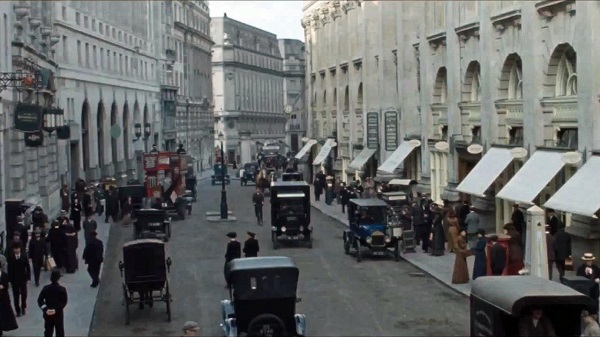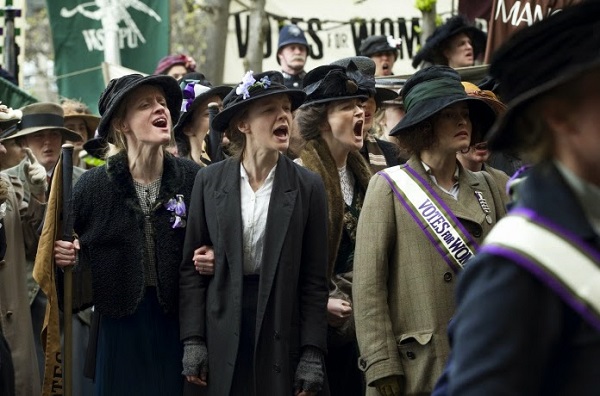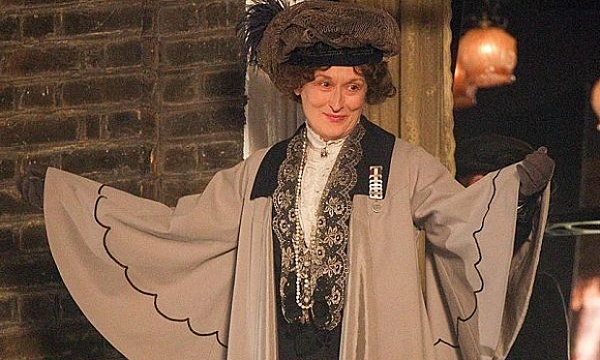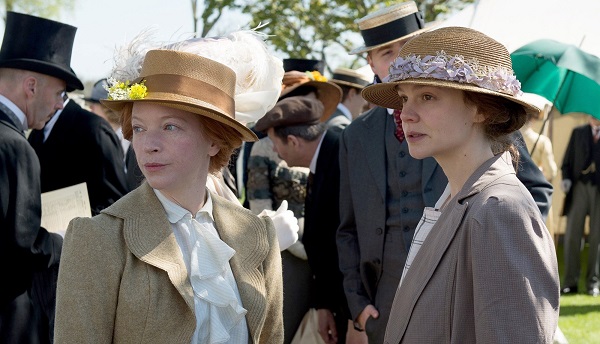Suffragette Review
"Deeds not words"
Suffragette is a movie made with good intentions, an historical drama about the fight for women to gain the right to vote. It was a major production where women dominated the major behind the scenes roles and boasted an impressive cast about an important movement in history, though it ended up being a watered down piece of historical fiction.
Maud Watts (Carey Mulligan) is a working class East-Londoner working in a laundry at the start of the Suffragettes' campaign of civil disobedience. She has a young son and she has shown little interest in politics until meeting with a new laundry worker, Violet Miller (Anne-Marie Duff) and is soon drawn into the movement as the campaign of violence escalates and the police and government crackdown on the Suffragettes. Maud ends up risking her life, liberty and family for the cause.

With the likes of Carey Mulligan, Anne-Marie Duff, Helena Bonham Carter, Brendan Gleeson and Ben Whishaw, it is easy to expect that the acting would be fantastic and the cast delivers. Mulligan has shown herself to be fantastic actress and again she is brilliant in the lead, donning a strong East London accent and being a woman going through a political awakening. The personal struggles she suffers by entering this world, makes her the audience surrogate.
Bonham Carter was also excellent as Edith Ellyn, a chemist and university educated woman who becomes the most militant member of the Suffragettes, being willing to engage with more violent acts to gain public attention for their cause. In real life, Bonham Carter's great-great-grandfather is H. H. Asquith who was the Prime Minister of Britain between 1908-1916 and staunchly opposed expanding the franchise to women.

Meryl Streep was heavily featured in the marketing campaign, playing the leader of the Woman Social and Political Union (WSPU), Emmeline Pankhurst. But her role is no more than a cameo, appearing for no more than five minutes. It's still Meryl Streep and she excels with showing Pankhurst's oratory skills telling her supporters to take up militancy. It would not be surprising that Streep gets another Oscar nomination for Best Supporting Actress because she was that good and you would want to see more of her.
Abi Morgan, the screenwriter of
The Iron Lady and
Shame, took on the scripting duties for
Suffragette. The best part of her screenwriting was the little character moments, adding to the backgrounds of Maud and Inspector Steed (Gleeson); Maud being abused by her boss and Steed's seeing the collateral damage violence protest can produce; motivating him to stop anyone getting harmed. With Sarah Gavron's direction we are about to read between the lines regarding what makes these characters tick.

Morgan and Gavron are also excellent at showing actual events like the bombing campaign on post boxes, the bombing on David Lloyd George's home and the escalation of the campaign. For history fans, there is enough there to keep you interested, even if it had to be told through the eyes of a fictional character and fictionalizing some of the events to justify her presence.
Suffragette is Gavron's second feature film, her first being an adaptation of
Brick Lane. She was at her best showing the harsh conditions of East London, using tight cinematography and close-ups that is effective at showing the crammed conditions of the Watts' home and the chemical filled environment of the laundry. Though the approach works for working class family drama and the force-feeding sequence, it is ill-fitting for the political drama.
Suffragette has the notable achievement of being the first feature film to be shot on location in the Houses of Parliament, but it does not use the famous building, just being shot with closes up of Maud. Even when there is a wide shot there was a horrible grainy look to it that just made the movie look ugly.

Morgan also injected some subplots, one of them being the foreman of the laundry (Geoff Bell) preying on a 12-year-old girl (Grace Stotter), but it was more shoehorned in to show horrors of the patriarchy, when women work in harsh conditions and having no political representation. Though one of the biggest cheers in my audience was when Maud attacked the rapist. Morgan and Gavron were also as focused on Maud's family struggle as much as on on the political situation, which makes
Suffragette overly melodramatic at times. When it does come to the political situation it is very on the nose and lacked any nuances in its work and recreation and in it speeches.
Last year we saw the release of
Selma, a drama about the work of Martin Luther King Jr. and his leadership of the Civil Rights Movement. It was great showing the different factors and ideals within the struggle and all different viewpoints within the government at the time, while balancing out Dr. King's personal dilemmas and doubts. This approach could have worked for a movie about the Suffragettes because there are many fascinating characters within the Suffragette Movement that could have been perfectly interesting without the need for a fictional surrogate. An example of some sloppy writing is a line saying that the WSPU leadership was divided because of the campaign of civil disobedience, saying it is going too far by attacking politicians, when actually seeing debate would have been more interesting. The comedy-drama
Made in Dagenham shares a basic structure with
Suffragette of an ordinary working-class woman who is thrust into a leading political leadership: but
Made in Dagenham was much more natural with its plotting compared to
Suffragette.
Suffragette was a well-meaning movie that had a brilliant cast. This will be a popular movie to be shown in classrooms the world over, but as an engaging movie it is lacking. A better movie about the Suffragette Movement could be made.
Pros
- Very loyal to real life events
- Excellent acting from its cast
- The recreation of early 20th Century London
Cons
- The use of a fictional surrogate
- Very unsubtle writing and directing
- Unnecessary subplots
- The close-up cinematography
- Not enough Meryl Streep
 With the likes of Carey Mulligan, Anne-Marie Duff, Helena Bonham Carter, Brendan Gleeson and Ben Whishaw, it is easy to expect that the acting would be fantastic and the cast delivers. Mulligan has shown herself to be fantastic actress and again she is brilliant in the lead, donning a strong East London accent and being a woman going through a political awakening. The personal struggles she suffers by entering this world, makes her the audience surrogate.
Bonham Carter was also excellent as Edith Ellyn, a chemist and university educated woman who becomes the most militant member of the Suffragettes, being willing to engage with more violent acts to gain public attention for their cause. In real life, Bonham Carter's great-great-grandfather is H. H. Asquith who was the Prime Minister of Britain between 1908-1916 and staunchly opposed expanding the franchise to women.
With the likes of Carey Mulligan, Anne-Marie Duff, Helena Bonham Carter, Brendan Gleeson and Ben Whishaw, it is easy to expect that the acting would be fantastic and the cast delivers. Mulligan has shown herself to be fantastic actress and again she is brilliant in the lead, donning a strong East London accent and being a woman going through a political awakening. The personal struggles she suffers by entering this world, makes her the audience surrogate.
Bonham Carter was also excellent as Edith Ellyn, a chemist and university educated woman who becomes the most militant member of the Suffragettes, being willing to engage with more violent acts to gain public attention for their cause. In real life, Bonham Carter's great-great-grandfather is H. H. Asquith who was the Prime Minister of Britain between 1908-1916 and staunchly opposed expanding the franchise to women.
 Meryl Streep was heavily featured in the marketing campaign, playing the leader of the Woman Social and Political Union (WSPU), Emmeline Pankhurst. But her role is no more than a cameo, appearing for no more than five minutes. It's still Meryl Streep and she excels with showing Pankhurst's oratory skills telling her supporters to take up militancy. It would not be surprising that Streep gets another Oscar nomination for Best Supporting Actress because she was that good and you would want to see more of her.
Abi Morgan, the screenwriter of The Iron Lady and Shame, took on the scripting duties for Suffragette. The best part of her screenwriting was the little character moments, adding to the backgrounds of Maud and Inspector Steed (Gleeson); Maud being abused by her boss and Steed's seeing the collateral damage violence protest can produce; motivating him to stop anyone getting harmed. With Sarah Gavron's direction we are about to read between the lines regarding what makes these characters tick.
Meryl Streep was heavily featured in the marketing campaign, playing the leader of the Woman Social and Political Union (WSPU), Emmeline Pankhurst. But her role is no more than a cameo, appearing for no more than five minutes. It's still Meryl Streep and she excels with showing Pankhurst's oratory skills telling her supporters to take up militancy. It would not be surprising that Streep gets another Oscar nomination for Best Supporting Actress because she was that good and you would want to see more of her.
Abi Morgan, the screenwriter of The Iron Lady and Shame, took on the scripting duties for Suffragette. The best part of her screenwriting was the little character moments, adding to the backgrounds of Maud and Inspector Steed (Gleeson); Maud being abused by her boss and Steed's seeing the collateral damage violence protest can produce; motivating him to stop anyone getting harmed. With Sarah Gavron's direction we are about to read between the lines regarding what makes these characters tick.
 Morgan and Gavron are also excellent at showing actual events like the bombing campaign on post boxes, the bombing on David Lloyd George's home and the escalation of the campaign. For history fans, there is enough there to keep you interested, even if it had to be told through the eyes of a fictional character and fictionalizing some of the events to justify her presence.
Suffragette is Gavron's second feature film, her first being an adaptation of Brick Lane. She was at her best showing the harsh conditions of East London, using tight cinematography and close-ups that is effective at showing the crammed conditions of the Watts' home and the chemical filled environment of the laundry. Though the approach works for working class family drama and the force-feeding sequence, it is ill-fitting for the political drama. Suffragette has the notable achievement of being the first feature film to be shot on location in the Houses of Parliament, but it does not use the famous building, just being shot with closes up of Maud. Even when there is a wide shot there was a horrible grainy look to it that just made the movie look ugly.
Morgan and Gavron are also excellent at showing actual events like the bombing campaign on post boxes, the bombing on David Lloyd George's home and the escalation of the campaign. For history fans, there is enough there to keep you interested, even if it had to be told through the eyes of a fictional character and fictionalizing some of the events to justify her presence.
Suffragette is Gavron's second feature film, her first being an adaptation of Brick Lane. She was at her best showing the harsh conditions of East London, using tight cinematography and close-ups that is effective at showing the crammed conditions of the Watts' home and the chemical filled environment of the laundry. Though the approach works for working class family drama and the force-feeding sequence, it is ill-fitting for the political drama. Suffragette has the notable achievement of being the first feature film to be shot on location in the Houses of Parliament, but it does not use the famous building, just being shot with closes up of Maud. Even when there is a wide shot there was a horrible grainy look to it that just made the movie look ugly.
 Morgan also injected some subplots, one of them being the foreman of the laundry (Geoff Bell) preying on a 12-year-old girl (Grace Stotter), but it was more shoehorned in to show horrors of the patriarchy, when women work in harsh conditions and having no political representation. Though one of the biggest cheers in my audience was when Maud attacked the rapist. Morgan and Gavron were also as focused on Maud's family struggle as much as on on the political situation, which makes Suffragette overly melodramatic at times. When it does come to the political situation it is very on the nose and lacked any nuances in its work and recreation and in it speeches.
Last year we saw the release of Selma, a drama about the work of Martin Luther King Jr. and his leadership of the Civil Rights Movement. It was great showing the different factors and ideals within the struggle and all different viewpoints within the government at the time, while balancing out Dr. King's personal dilemmas and doubts. This approach could have worked for a movie about the Suffragettes because there are many fascinating characters within the Suffragette Movement that could have been perfectly interesting without the need for a fictional surrogate. An example of some sloppy writing is a line saying that the WSPU leadership was divided because of the campaign of civil disobedience, saying it is going too far by attacking politicians, when actually seeing debate would have been more interesting. The comedy-drama Made in Dagenham shares a basic structure with Suffragette of an ordinary working-class woman who is thrust into a leading political leadership: but Made in Dagenham was much more natural with its plotting compared to Suffragette.
Suffragette was a well-meaning movie that had a brilliant cast. This will be a popular movie to be shown in classrooms the world over, but as an engaging movie it is lacking. A better movie about the Suffragette Movement could be made.
Morgan also injected some subplots, one of them being the foreman of the laundry (Geoff Bell) preying on a 12-year-old girl (Grace Stotter), but it was more shoehorned in to show horrors of the patriarchy, when women work in harsh conditions and having no political representation. Though one of the biggest cheers in my audience was when Maud attacked the rapist. Morgan and Gavron were also as focused on Maud's family struggle as much as on on the political situation, which makes Suffragette overly melodramatic at times. When it does come to the political situation it is very on the nose and lacked any nuances in its work and recreation and in it speeches.
Last year we saw the release of Selma, a drama about the work of Martin Luther King Jr. and his leadership of the Civil Rights Movement. It was great showing the different factors and ideals within the struggle and all different viewpoints within the government at the time, while balancing out Dr. King's personal dilemmas and doubts. This approach could have worked for a movie about the Suffragettes because there are many fascinating characters within the Suffragette Movement that could have been perfectly interesting without the need for a fictional surrogate. An example of some sloppy writing is a line saying that the WSPU leadership was divided because of the campaign of civil disobedience, saying it is going too far by attacking politicians, when actually seeing debate would have been more interesting. The comedy-drama Made in Dagenham shares a basic structure with Suffragette of an ordinary working-class woman who is thrust into a leading political leadership: but Made in Dagenham was much more natural with its plotting compared to Suffragette.
Suffragette was a well-meaning movie that had a brilliant cast. This will be a popular movie to be shown in classrooms the world over, but as an engaging movie it is lacking. A better movie about the Suffragette Movement could be made.